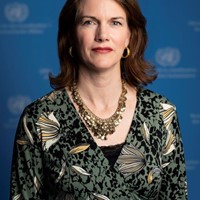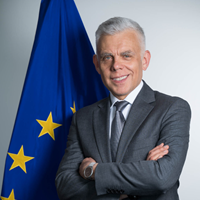




Susan Fogarty
APA
Organisation
European Parliament
EU institutions
Speaker session
Unlocking efficiency through flexible funding: Responding to new needs and changing operational contexts
Auditorium
This workshop will provide a platform for discussion on good practices as well as barriers to the promotion of multiannual and flexible funding. It will evaluate what good practices in flexible funding are, and how these can be showcased to provide donors with an enhanced scope and incentive to increase this kind of financing. The discussion will also bring attention to the value of flexible funding by international aid organisations in relation to local partners. Finally, the efficiency gains unlocked through flexible funding, as well as the impact of improved reporting, transparency and visibility from agencies and NGOs will be discussed.
Mitigating climate-driven disasters: Scaling up resilience and anticipatory action
Auditorium
The session will highlight the impact of climate change on at risk communities and identify gaps in the resilience of communities to climate shocks. It will investigate the importance of all actors across the Humanitarian-Development-Peace Nexus to ensure a holistic approach to building resilience to shocks. The session will investigate actions that Nexus actors could take to support at risk communities to build their resilience to climate shocks, and will also discuss the role of anticipatory action in addressing the impacts of climate change.

Deike Potzel
Director-General for Crisis Prevention, Stabilisation, Peacebuilding, Humanitarian Assitance
Organisation
German Ministry for Foreign Affairs
Member State authority
Speaker session
Unlocking efficiency through flexible funding: Responding to new needs and changing operational contexts
Auditorium
This workshop will provide a platform for discussion on good practices as well as barriers to the promotion of multiannual and flexible funding. It will evaluate what good practices in flexible funding are, and how these can be showcased to provide donors with an enhanced scope and incentive to increase this kind of financing. The discussion will also bring attention to the value of flexible funding by international aid organisations in relation to local partners. Finally, the efficiency gains unlocked through flexible funding, as well as the impact of improved reporting, transparency and visibility from agencies and NGOs will be discussed.
Mitigating climate-driven disasters: Scaling up resilience and anticipatory action
Auditorium
The session will highlight the impact of climate change on at risk communities and identify gaps in the resilience of communities to climate shocks. It will investigate the importance of all actors across the Humanitarian-Development-Peace Nexus to ensure a holistic approach to building resilience to shocks. The session will investigate actions that Nexus actors could take to support at risk communities to build their resilience to climate shocks, and will also discuss the role of anticipatory action in addressing the impacts of climate change.

Tom De Groeve
Deputy Head of Unit
Biography
Tom De Groeve, Acting Head of the Disaster Risk Management Unit, Joint Research Centre of the European Commission. I lead a unit of providing scientific solutions for all phases of the disaster risk cycle. In particular, the Unit focuses on enhanced situational awareness for crisis management and on understanding and acting on risks of the future.
Organisation
European Commission Joint Research Centre
EU institutions
Speaker session
Unlocking efficiency through flexible funding: Responding to new needs and changing operational contexts
Auditorium
This workshop will provide a platform for discussion on good practices as well as barriers to the promotion of multiannual and flexible funding. It will evaluate what good practices in flexible funding are, and how these can be showcased to provide donors with an enhanced scope and incentive to increase this kind of financing. The discussion will also bring attention to the value of flexible funding by international aid organisations in relation to local partners. Finally, the efficiency gains unlocked through flexible funding, as well as the impact of improved reporting, transparency and visibility from agencies and NGOs will be discussed.
Mitigating climate-driven disasters: Scaling up resilience and anticipatory action
Auditorium
The session will highlight the impact of climate change on at risk communities and identify gaps in the resilience of communities to climate shocks. It will investigate the importance of all actors across the Humanitarian-Development-Peace Nexus to ensure a holistic approach to building resilience to shocks. The session will investigate actions that Nexus actors could take to support at risk communities to build their resilience to climate shocks, and will also discuss the role of anticipatory action in addressing the impacts of climate change.











